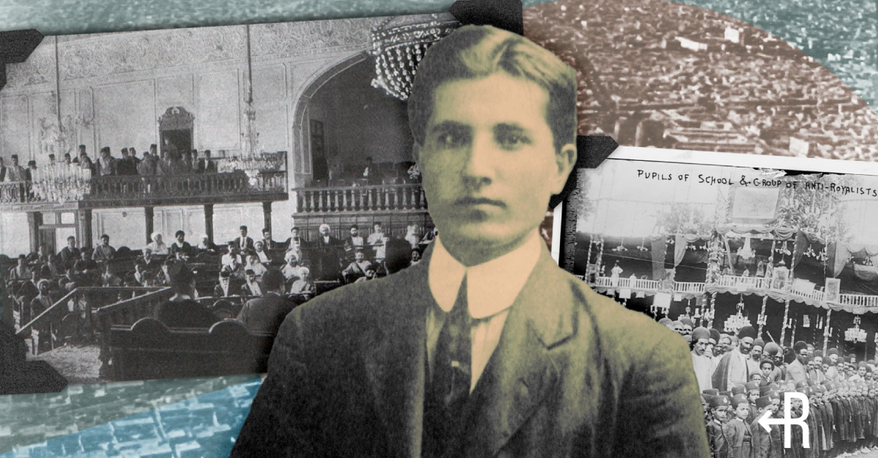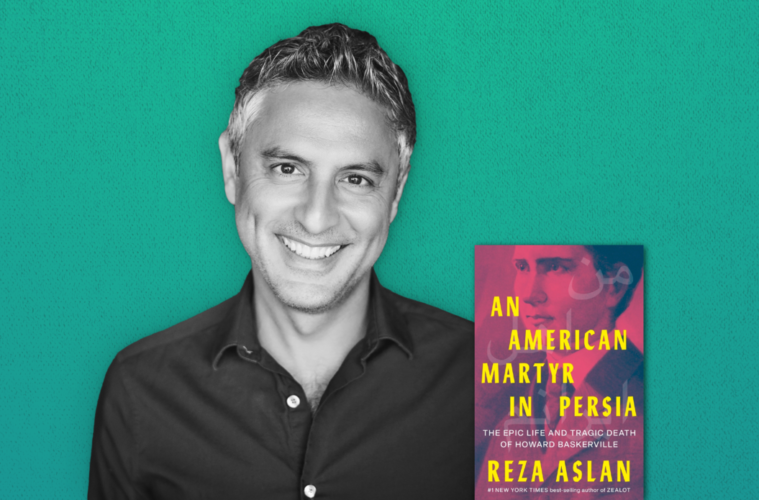For fans of scholar, author, media guy, and lightning rod Reza Aslan, last night — Tuesday, November 1 — should have been a celebration. He’s been on a national tour supporting his new book An American Martyr in Persia (Norton), and the planned event at The Wallis was to be a sort of homecoming, featuring friends, family, and colleagues in his long-time hometown of Los Angeles. Beyond a discussion of the book itself — the first thorough biography recounting and contextualizing the adventures of one Howard Baskerville, a young Christian missionary to Tabriz whose life ended playing an outsize role in Persia’s bloody constitutional revolution at the dawn of the 20th century — Aslan had hoped to welcome an eclectic and engaging cohort of diasporic voices from what is lovingly known as Tehrangeles to the stage to help contextualize this seismic but largely unknown story in terms of current events in Iran. There was also going to be music, memories, probably some outrage, certainly politics, and as always with Aslan’s appearances, the addressing of protest and pushback. In the end, none of that happened.

CANCELLED November 1, 2022: A Night of Solidarity With The People of Iran Hosted By Reza Aslan
Instead, ticket holders received this short note from the venue: “We are reaching out to let you know that the organizers of Writers Bloc’s ‘A Night of Solidarity with the People of Iran, hosted by Reza Aslan’ on November 1st have elected to cancel the event.” Reached for comment, Aslan confirmed that he was the one who called it off. At the time of this decision, he was fresh off major tour stops being canceled by Stanford and by Town Hall Seattle, who reported receiving hundreds of emails threatening disruptive protests and demanding Aslan’s cancellation (literally and figuratively).
Aslan got an email from the Executive Director of Town Hall Seattle the day before his late October event there that explained their decision to postpone the event was, “the expectation of a significant public protest that would disrupt activity across the whole building, on a night with all three venues in use.” Their official statement on the situation iterated their commitment to “maximizing the expression of ideas and creativity in our region,” and pointed to concerns that grew out of “hearing the feedback we’ve received in the last 24 hours.” Sounds reasonable. The venue had hosted Aslan more than once over the years, so it’s not like they didn’t know what he is all about or that he has detractors, but it seems like this late onslaught caught them somewhat by surprise.
“Someone sent me a copy of the email that’s being blasted to venues,” Aslan tells the LA Weekly. “Apparently [Town Hall] Seattle got hundreds of these, almost all of them the exact same text. This same cut and paste email was sent to Rakestraw Books in Danville, CA about 200 times and is now being sent to my sons’ elementary school where I’m doing a talk for the students! The emails are all verbatim word for word but sent by different people. It’s hard to believe how Seattle would have fallen for this.” Aslan was shocked and saddened and more than a little angry about this, which is both understandable and also a success from the emailers’ perspective.
If you’re going to cave to the mob and cancel a speaker out of fear, fine. Just admit it. But don’t lie about it to your supporters @THSEA
Shameful behavior all around. @seattletimes
— Reza Aslan (@rezaaslan) October 20, 2022
An example of one of these hundreds of identical emails, forwarded to Aslan by someone at one of the venues, lays out the case that Aslan ought to be uninvited.
To whom it may concern,
As an Iranian, I found out about the unfortunate event being held by the Rakestraw Books for Mr. Reza Aslan, who, up until a few days ago, was the advisor to the National Iranian American Council (NIAC) under scrutiny for lobbying for Islamic Republic and its interests. Indeed his recent book reviews at Stanford and Town Hall Seattle were just canceled for the exact same reason as well as for his ongoing spreading of disinformation and misinformation regarding Iran events and whitewashing Islamic Republic’s crimes against humanity.
But wait, don’t most people know Aslan as a progressive scholar of world religions, a Muslim whose own family was among the hundreds of thousands of families forced to flee the oppressive regime installed in Iran in the late 1970s? Has he not been a vocal critic of the regime’s brutal destruction of personal and cultural freedoms, including and especially at this pivotal moment of a new generation of pro-democracy activists taking to the streets? Not to mention his track record of being progressive in his takes on US politics? Yes, yes, and yes.
The issue that this email-blanketing campaign has is with Aslan’s affiliation with the above-referenced NIAC, an organization with a position that he describes as both anti-regime and anti-war. Basically, they want to support the Iranian people’s own path to freedom in whatever ways they can, short of an American invasion and land war. This lack of support for a foreign military solution and proponency of the nuclear deal (in the name of easing sanctions which they argue only cause more suffering to the people without affecting the regime’s grip on power) has prompted some to claim they are apologists for the regime. As the Middle East Eye reported on this week, it’s a decades-long, complicated, emotional conflict widespread in the diasporic community, and the rhetoric is only getting more heated.
Aslan’s response to the email campaign is presented in the context of stepping down from NIAC’s advisory council, where he feels he has become a distraction to the cause. As you can see from the comments below his recent post, he has not changed many minds with this message.
Why I am stepping down from my advisory role at NIACpic.twitter.com/Du8DssMXLG
— Reza Aslan (@rezaaslan) October 21, 2022
In the end, however, Aslan called off The Wallis event for a reason far more simple than this gordian knot of politics, resentment, suspicion, passion, misinformation, agendas, bellicosity, bullying, mistrust, and generational trauma. He called it off because he was not willing to put his family in danger. He’s used to being in the spotlight and the proverbial crosshairs, he knows he pokes the bear, but his friends, his wife and young kids, his aunt the singer Leila Forouhar who was going to perform last night — these people whom he loves he was not willing to put at risk in any way. So The Wallis issued refunds.
As a small consolation for anyone looking forward to attending last night, here is a video that Aslan’s Aunt Leila recently made with global superstar Googoosh that gives a sense of the event’s intended energy.
But then wasn’t all of this about a book tour? Yes! The book! An American Martyr in Persia: The Epic Life and Tragic Death of Howard Baskerville is an engrossing, entertaining, evocative, and unexpectedly cinematic story, a pleasure to read in that specific way where it’s impossible not to imagine the movie or ten-episode series in your head as you go. For both the facts of the story and Aslan’s unique ability to merge literary flourish with accessible scholarship and historical deep-dives, it’s a page-turner the likes of which are rarely produced in the historical biography genre. For its filling of a major gap in the library of geopolitical history, its resonance with the present-day strife in Iran, its echoes of other historical political battlelines in the region, and its celebration of how sincere faith of any denomination can inform a more noble and humanistic view of international relations, it’s required reading. What the book itself is not, and nor should it be, is controversial.

Renee Bright/Wikimedia Creative Commons
The story of an American missionary from South Dakota who was stationed in Persia in 1907 for a two-year contract where he was meant to be teaching English and spreading the gospel of Christ, the book expertly delves into centuries of familial and national history to provide context and insight into the situation Baskerville encountered — so different from the one he expected. Told to be wary of a nation of more or less savage tribal godlessness, instead he found a vibrant community of proud and curious-minded students in the grip of a bloody struggle for a constitutional form of government dedicated to self-determination and equality. He found the city of Tabriz to be a religiously and culturally diverse community of tolerance and inspired ideals of freedom. In the end, it was they who educated him, and he fell in love with the place. He gave his life in defense of its liberation, and his martyrdom became a legend whose power endures to this day in Iran while never being taught or really even acknowledged in the US.
The way Aslan introduces each new figure in the story with a nested subplot of personal and political backstory explains the forces of government interests from the hyperlocal to the international, leaving readers with an accidental education in the region’s immense history. But the action, the excitement of the book, comes from its cinematic center of gravity as a hero’s journey. “Can you see Baskerville in one of those dark, smoke-filled rooms,” reads one passage. “Listening to these fresh-faced revolutionaries arguing about popular sovereignty and inalienable rights, his mind harkening back to another band of revolutionaries who also had no chance of succeeding yet, nevertheless, did?”
As Aslan recently told NPR about what drew him to see this story finally told and its parallels with the modern era, “I’ve been studying, you know, Iranian history going back all the way to the dawn of the 20th century. And I can tell you with confidence, I’ve never seen anything like this before… Of course, in 1906, people came from all over the world with guns and bombs and actually physically joined the revolution. That’s not really, of course, possible today, nor is it advisable. But the truth is that we have something even more powerful than guns and weapons. We have our voices.”
If all goes according to plan, Aslan will continue the book tour, with its next stop in Portland, then Boise and Chicago. Fortunately, no matter what happens or fails to happen with the discourse in these public settings, no one can stop folks from reading the book for themselves, and, as is their right, to draw their own conclusions and inspirations from its meaning.

Reza Aslan in 2019 (Photo by Danny Liao)
Editor’s note: The disclaimer below refers to advertising posts and does not apply to this or any other editorial stories.
Advertising disclosure: We may receive compensation for some of the links in our stories. Thank you for supporting LA Weekly and our advertisers.

